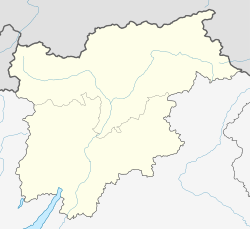Kuens
Kuens | |
|---|---|
| Gemeinde Kuens Comune di Caines | |
| Coordinates: 46°42′N 11°10′E / 46.700°N 11.167°E | |
| Country | Italy |
| Region | Trentino-Alto Adige/Südtirol |
| Province | South Tyrol (BZ) |
| Government | |
| • Mayor | Manfred Raffl |
| Area | |
• Total | 1.7 km2 (0.7 sq mi) |
| Population (Nov. 2010)[2] | |
• Total | 399 |
| • Density | 230/km2 (610/sq mi) |
| Demonym(s) | German: Kuensner Italian: comesi |
| Time zone | UTC+1 (CET) |
| • Summer (DST) | UTC+2 (CEST) |
| Postal code | 39010 |
| Dialing code | 0473 |
| Website | Official website |
Kuens (German: [ˈkuːəns]; Italian: Caines [ˈkaines]) is a comune (municipality) and a village in South Tyrol in northern Italy, located about 25 kilometres (16 mi) northwest of the city of Bolzano in the Passeier Valley.
Geography
[edit]As of 30 November 2010, it had a population of 399 and an area of 1.7 square kilometres (0.66 sq mi).[3]
Kuens borders the following municipalities: Riffian, Schenna and Tirol.
History
[edit]In the early eighth century, Kuens became the site of a small monastery founded by Saint Corbinian, who had been struck by the area's beauty on the second of his journeys to Rome. He bought some properties and planted vineyards and orchards and considered the area a "spiritual homeland", so much so that he chose it as the site for his burial.[4]
Coat-of-arms
[edit]The emblem represents a bishop (that is, Saint Corbinian) with a gules mantle, the mitre of Or and aureola; a pastoral staff of Or in his right hand. A brown bear, with a load tied up to her back, through the bishop. The emblem was adopted in 1968.[5]
Society
[edit]Linguistic distribution
[edit]According to the 2024 census, 97.04% of the population speak German, 2.43% Italian and 0.54% Ladin as first language.[6]
Demographic evolution
[edit]| Year | Pop. | ±% |
|---|---|---|
| 1880 | 160 | — |
| 1910 | 219 | +36.9% |
| 1921 | 200 | −8.7% |
| 1931 | 204 | +2.0% |
| 1936 | 193 | −5.4% |
| 1951 | 225 | +16.6% |
| 1961 | 210 | −6.7% |
| 1971 | 242 | +15.2% |
| 1981 | 272 | +12.4% |
| 1991 | 304 | +11.8% |
| 2001 | 318 | +4.6% |
| Source: Data from ISTAT | ||
References
[edit]- ^ "Superficie di Comuni Province e Regioni italiane al 9 ottobre 2011". Italian National Institute of Statistics. Retrieved 16 March 2019.
- ^ "Popolazione Residente al 1° Gennaio 2018". Italian National Institute of Statistics. Retrieved 16 March 2019.
- ^ All demographics and other statistics: Italian statistical institute Istat.
- ^ Mitterer, Sigisbert (1928). "Die Bedeutung des hl. Bonifatius für das bayerische Klosterwesen". Studien und Mitteilungen zur Geschichte des Benediktiner-Ordens und seiner Zweige. 46: 333–60.
- ^ Heraldry of the World: Kuens
- ^ "Ergebnisse Sprachgruppenzählung 2024/Risultati Censimento linguistico 2024". astat info (56). Provincial Statistics Institute of the Autonomous Province of South Tyrol. December 2024. Retrieved 2024-12-09.
External links
[edit]- (in German and Italian) Homepage of the municipality
![]() Media related to Kuens at Wikimedia Commons
Media related to Kuens at Wikimedia Commons





